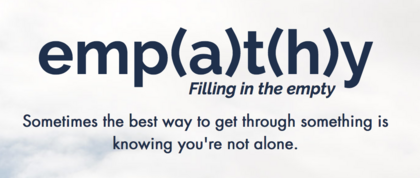
“On February 5th, 2016, I felt my world turn upside down. While at my internship in New York City, I got a call from my mother that I will never forget. My father had died suddenly of a heart attack. I was in shock. I didn’t know what to do or who to go to. I was at school in New York while my family were back in Baltimore, so I was missing the people that would be able to understand what I was going through. One of my best friends had just distanced herself from me, and many of my other friends had gone to study abroad. I was in the most populous city in America, and yet I had never felt more isolated.
Unfortunately, soon after, a close friend of mine also lost his father. On his trip down to college to start his first semester just days after this tragedy, he stopped by my house. I will always remember the physical relief I saw in him when he finally got into my room. We talked about our situations, and he told me that he felt better talking to me because he knew I could understand. He knew he wouldn’t have to deal with the same questions and comments he got from everyone else. He knew I could empathize, rather than sympathize, and this helped him in some way.
I wanted to use my experience to do something good, and connect people while fostering empathy. Through this, the idea for emp(a)t(h)y was born.”
The truth is, adversity does not discriminate. We all experience hardships, and while we may be fortunate enough to have the resources, the support system, or the mechanisms to cope, there is something that is often missing from these outlets. That is empathy, the ability for someone to understand what you’re going through.
On college campuses, especially in big cities, students are often victims of isolation and loneliness. Mental health issues are more prevalent than ever. The National Data on Campus Suicide and Depression reports that 1 in 12 U.S. college students make a suicide plan, 49.5% of students felt hopeless in the year of 2015, and 60.5% reported feeling lonely. Mental illness is surpassing physical illness, yet we still struggle with engaging in a dialogue and eradicating the harsh stigmas that associate with mental health. Despite the wellness centres and resources made available on college campuses, they often do not address the root cause of students’ most pressing problems.
As we are all different, mental health issues never have a “one size fits all” solution. We all feel, think, and have experiences that are not necessarily alike. We therefore need solutions that focus on the person, the individual. The stories that made them, tore them apart, and paved the way for a promising future. The experiences that others can relate to, be inspired by, and develop a community where altruism takes precedent.
Emp(a)t(h)y is a mobile platform whereby college students can match with others based on shared experiences, transforming that empty feeling into one of empathy. Users will have the opportunity to talk to others who have experienced similar adversities, give or receive help, and access relevant mental health resources.
“This could be a great supplement for wellness practice, especially for those who are lacking a sense of connection with their peers and have a reluctance to seek professional help.” - Psychology Professional
This innovation focuses on the individual, the person. Emp(a)t(h)y is humanizing healthcare and providing youth with the power to not only transform their own lives, but the lives of others. Society cannot move forward unless its people are in good health. And empathy, the ability to understand what someone is going through based on a shared experience, is the solution.
“I’ve never spoken to someone else who also has PTSD. This app would give me a platform to explore a conversation I’ve been curious about for so long.” - Student, New York University
The emp(a)t(h)y team is currently fundraising in order to develop the app. Donate to support their development here https://www.gofundme.com/empathy-development and check out their website www.empathynewyork.com
The original article appeared on the Huffington Post on June 14, 2017. Read it here: http://www.huffingtonpost.com/entry/new-startup-combats-mental-health-using-empathy_us_59413f7de4b03e17eee08846